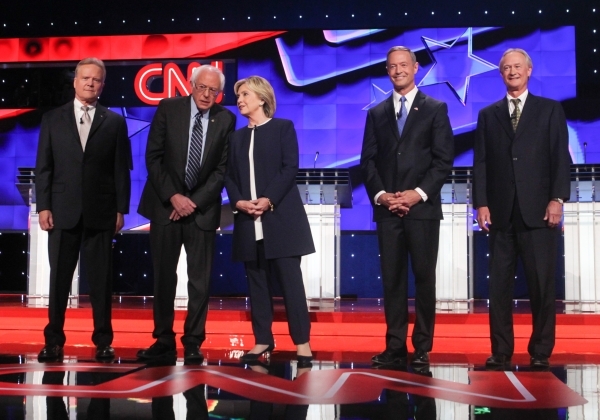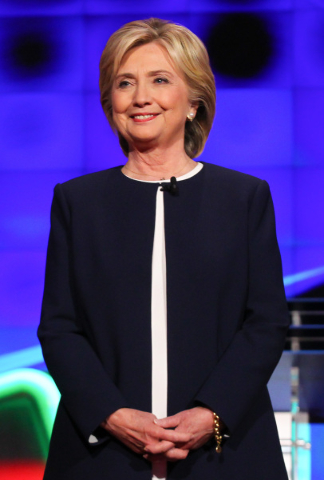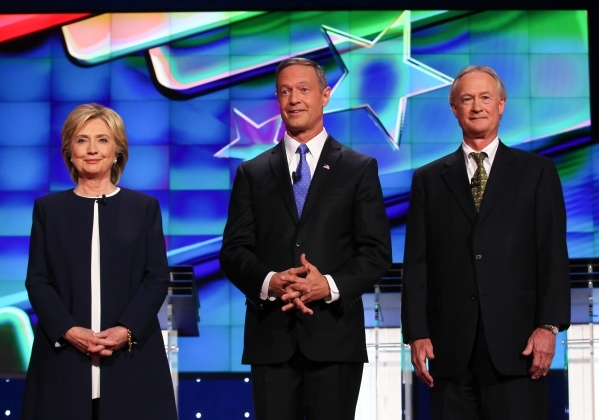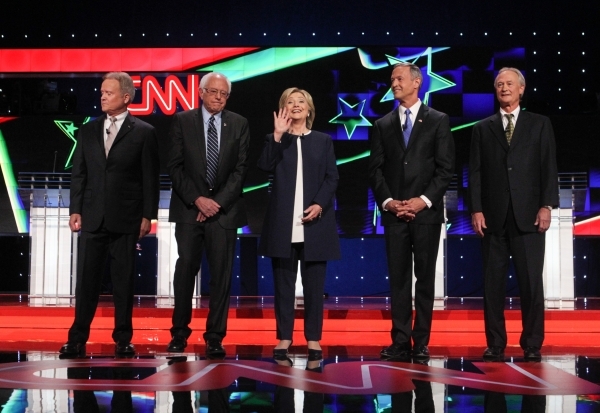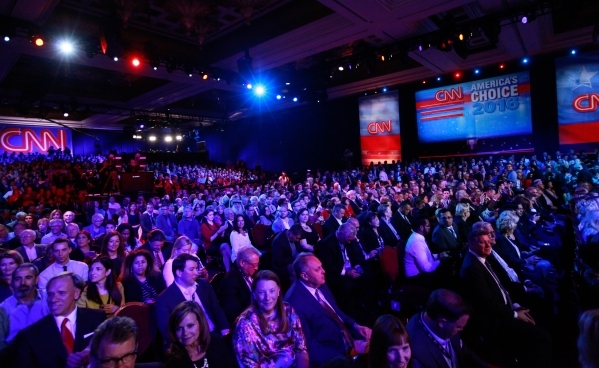10 takeaways from the first Democratic debate
What if they had a debate and nobody called anybody a loser?
Oh, wait, they just did.
The top five Democratic candidates gathered Tuesday at the Wynn Las Vegas to talk politics, policy and — perhaps for the final time — Hillary Clinton's emails.
Here's some post-debate observations:
1. Stop comparing Wall Street banks with casinos! Vermont Sen. Bernie Sanders started it, but the meme got repeated during the night. Yes, Wall Street did gamble with Other People's Money, resulting in big losses and nearly crashing the global economy. But they're nothing like casinos and here's why: First, casinos actually make money. Second, casinos have an advantage, but at least they offer gamblers some chance to win. They're regulated and cannot engage in fraud. Banks? Not so much. As American Gaming Association President and CEO Geoff Freeman tweeted during the debate: "We're strong community partners who provide good jobs & billions in tax revenues like few other industries."
2. Capitalism found its defender — sort of. Clinton has always been a centrist, and the contrast with Sanders was inevitable. But she went so far as to defend capitalism in a Democratic sort of way. Capitalism helps small business (which everyone loves), she said. Sometimes, "we have to save capitalism from itself," she said. (In other words, it can run amok and needs a proper governor.) And the money line: "We are not Denmark. We are the United States of America," she said. Bazinga. But hasn't the America system featured some socialist elements embodied in the New Deal and the Great Society? Are Americans so different than people in Denmark, or France, or Canada, or Great Britain or Australia, which all have socialist elements in their economies?
3. Up with technocrats! Clinton got a lot of credit for her videotaped exchange with a Black Lives Matter activist not long ago, as she described how things change: through laws, through systems, through programs. She said something similar on Tuesday."I'm a progressive. But I'm a progressive who knows how to get things done," she said. Like it or not, that was a shot at Sanders, who has few legislative accomplishments he can claim as his very own, despite spending a long time in the Congress.
4. Fight on economy, but not on guns? Sanders was considered vulnerable on the gun issue going in to the debate, because of some of his gun-friendly votes. His lion's roar when it comes to taxes and taking on corporations and the wealthy suddenly turned to softer tones when it comes to guns. "All the shouting in the world will not do what I hope all of us want to do," Sanders said, i.e. reduce gun violence. But guns in America are made by corporations, and their lobby is one of the most powerful in Washington, D.C. Why should Sanders' rhetoric be different for Smith & Wesson or Glock than it is for GlaxoSmithKline or hedge funds? And while Sanders is adamant about forming a coalition to attack monied interests, he's more respectful of differences on guns. (He said the residents of his rural state have differing views, and a consensus must be forged.) But there are different views on health care for all, free college tuition and a $1 trillion infrastructure program, too, and Sanders doesn't call for building consensus there. The contrast in his rhetoric can be explained in part by the nature of gun ownership (it's in the Bill of Rights, after all), but its still an area of inconstancy for a candidate who touts his consistency.
5. Common ground on guns? Why? Former Rhode Island Gov. Lincoln Chafee similarly urged finding common ground with the firearms industry, perhaps by reaching out to Wayne LaPierre, the head of the National Rifle Association. But that begs the question: Since the industry is so powerful, and since it's been able to block even the smallest gun-control ideas even in the wake of dead elementary school children, what possible motive would the industry have to compromise? They're winning.
6. The Iraq War. Let's not quibble over the use of too-forgiving language regarding the fictional justifications for the Iraq War. (It was not a "blunder," as former Maryland Gov. Martin O'Malley said. And while Sanders is right that it was the worst foreign-policy decision in American history, it was so much more than that: It was a lie, and an unpunished crime.) But the common refrain is that everybody believed Iraq had WMDs, and that a vote for the war was based on the best information available at the time. But Sanders and Chafee both cited their votes against the war, notwithstanding that evidence, which undercuts anybody (looking at you, Secretary Clinton) who says the vote was justifiable although later proven incorrect. "I knew there was no real evidence of WMD in Iraq because I did my homework," Chafee said.
7. The end of the email issue? Months ago, when Sanders visited Las Vegas, he was asked by my late Review-Journal colleague Laura Myers if people cared about Clinton's emails. "No," was his immediate reply. And he made his position clear during the debate's best moment when moderator Anderson Cooper brought the issue up. "The American people are sick and tired of hearing about your damn emails," Sanders said, to cheers. "Enough of the emails! Let's talk about the real issues facing America." The two rivals for the nomination shook hands and smiled as the crowd cheered. (It's not really the end, of course. Clinton will face a congressional committee later this month to answer questions about them.)
8. The new New Deal. Clinton will never be mistaken for Sanders, although her rhetoric sometimes ventures close to his. But she said there was a consensus on one issue, even among Republicans: We can't keep locking up more people than any other country. Instead, we need to spend money on early childhood education, housing and other programs. "We need a new New Deal," she said. Later, she acknowledged that income inequality was worse than at any time since the 1920s, before the Great Depression. All true. But the New Deal was one of the heaviest lifts ever in American politics. It wasn't done by thinking small, but rather, the opposite. Yet is seems to be Sanders (and, to a lesser extent, O'Malley, who are talking about that kind of change.)
9. Too big to fail. There was a humorous moment when Cooper tried to bait Sanders by saying Clinton's Wall Street reform program was more aggressive than his. He disagreed, and he was right: Sanders is calling for breaking up big banks now, while Clinton's plan would allow regulators to do so if they find there's good cause. He called fraud "part of the business model" for some banks. And he and O'Malley endorsed the return of Glass-Steagall banking regulations to help prevent another financial crisis like the one that took place in 2008. "In my view, … Congress does not regulate Wall Street, Wall Street regulates Congress," Sanders said. But interestingly, even Sanders said he would not have let the world economy crash because of the depredations of the banks. It goes to show: If the big banks need another bailout, they'll probably get one, no matter who is in the White House. That means it's all the more important to do whatever is necessary to make sure that one doesn't become necessary.
10. You say you want a revolution… Sanders, if nothing else, doesn't shy away from the magnitude of the task he's outlined for himself. Big corporations, whether they produce oil, prescription drugs, newspapers and TV broadcasts or financial services, are going to be hard to beat. "The only way we really transform America is through a political revolution, with people coming together to say our government is going to work for all of us and not just a handful of corporations," Sanders said. Former Virginia Sen. Jim Webb was not impressed, saying "I don't think that revolution is going to come." If Webb is right, then there's really not much that can be done to enact the progressive agenda that Sanders outlines, and an incrementalist, centrist, consensus-based approach will emerge as the chief option. (Yes, we've been doing that for years with ever-decreasing success, but that's not stopped us from repeating it.) But if Webb is wrong, and America is finally ready for at least some of what Sanders is talking about, well, that would really be something to see.
Steve Sebelius is a Las Vegas Review-Journal political columnist and co-host of "PoliticsNOW," airing 5:30 p.m. Sundays on 8NewsNow. Follow him on Twitter (@SteveSebelius) or reach him at 702-387-5276 or ssebelius@reviewjournal.com.




